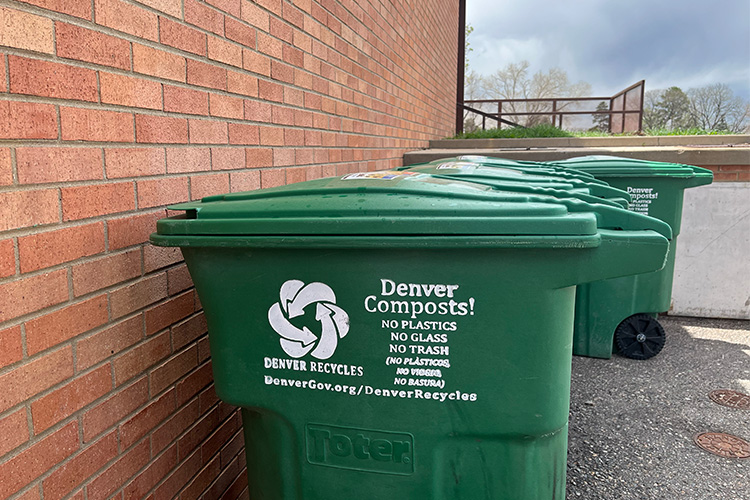
Denver’s new throw-as-you-go waste program has homeowners paying for trash rather than compost. photo by Shana Saint-Phard.
Denver has a new plan for waste management, which involves residents paying for trash collection.
In January of 2023, the City of Denver introduced a new policy for waste management. The initiative intends to reduce high-volume waste, although it has become a financial challenge for low-income households. Instead of homeowners paying a monthly fee of $9.75 for compost, they will have to pay for trash collection, while compost and recycling will be free. The monthly trash expenses include $9 for 35 gallons of waste, $13 for 65 gallons, and $21 for a 95-gallon trash barrel. Although the policy was introduced in January, it doesn’t fully go into effect until July. The city will distribute waste barrels to all single-unit households who wish to change their current size by July. This policy has created lots of hope for sustainability, although many homeowners are discouraged. Denver resident Wade Goergen said, “I’m kinda annoyed at it. Now it’s a monthly fee that adds up so it’s less money we have to do the things we want or need to do.”
Increasing compost collection services has created high demand for trash collectors. “The city hired 11 new drivers and needs more, offering $5,000 signing bonuses and hourly wages between $21.70 and $32.55 an hour to ensure the jobs are filled,” according to Axios Denver.
Before the “pay-as-you-throw” recycling plan, Denver’s 2021 City General Fund paid for trash and recycling partially through property taxes from the 180,000 trash customers. This fund never fully covered trash collection, though, so the rest was covered by “all residential property taxes, including residents who don’t receive city trash collection services, property taxes from commercial properties who also don’t receive city collection services, and sales and use tax revenue paid for by everyone in Denver, including visitors,” according to the city’s overview of the new program. Thus, as the pay-as-you-throw initiative fully goes into effect, the City General Fund will likely have a greater budget for community planning and development, such as public and environmental health, housing stability, and general services.
Residents who do not receive city trash collection services will not pay additional taxes that do not apply to their household situation under the pay-as-you-throw system. According to Denver’s 9News, “currently, Denver has a $25 million budget to pick up the approximately 171,000 tons the department collects each year.” This budget will be reduced because individual households will pay for the service, and the excess budget will go elsewhere.
Discounts on waste services will be provided to low-income households by Denver’s Solid Waste division (at a single-family home, townhome, duplex, or apartment in a complex with seven or fewer units). Each household that meets the income requirements are eligible to apply for rebates for waste collection services. For a one-person household, a discount is provided if their annual household income is up to $49,230, and the maximum household unit of 12 people can receive a discount if their annual household income is up to $115,440. The Expanded Waste Collection Services website has additional pricing information and FAQs.